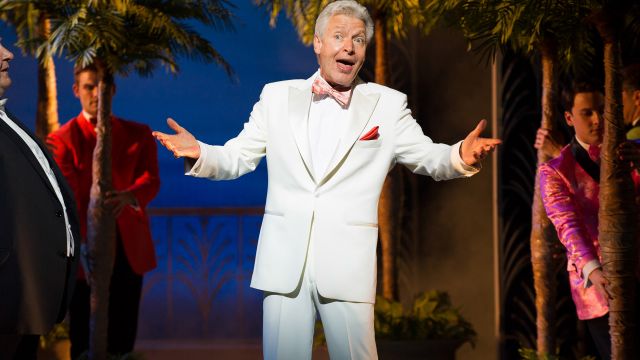Tony Sheldon: Musicals Globe Trotter
TONY SHELDON, now a resident of New York, has returned to Australia for Dirty Rotten Scoundrels. He tells FRANK HATHERLEY about starring on Broadway (loves it) and London’s West End (not happy at all).
“I live in New York now. I have my Green Card and I’m a permanent resident.”
But Tony Sheldon isn’t home right now. He’s just finished a strenuous day rehearsing the new production of Dirty Rotten Scoundrels in Sydney. He looks fresh and fit, with very white hair and very blue eyes. He has a rich baritone voice with a cultured, theatrical accent — a mixture of Australian and London with a dash of Manhattan, perhaps.
“I live in Inwood, which is the northernmost tip of Manhattan. My friends Will Swenson and Audra McDonald [Broadway royalty: Google them] bought a terrace there and asked if I would like to live in it. I said I would love to have Audra as my landlady. She has won five Tony Awards. I could knock on her door and ask to borrow a cup of talent.
“I wake up every day knowing it was the right decision to make. I think a lot of it came from the age that I am [he’s currently 58]. I was taken over there with an Australian musical which was always The Dream. I was welcomed so warmly by the theatrical community and urged to stay by pretty much everybody.”
Sheldon, of course, had landed in New York after the worldwide success of Priscilla, Queen of the Desert, with which he will be forever linked. He created the central role of transsexual Bernadette during a 10-day workshop in Melbourne before opening in Sydney in October 2006.
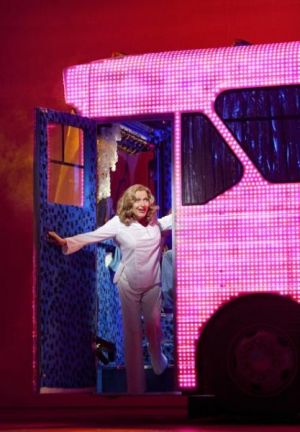 After a two-year Australian and New Zealand tour he reprised the role for a year (2009/10) at the Palace Theatre, London for Andrew Lloyd Webber’s Really Useful Company. A sold-out Toronto tryout led to 15 months (2011/12) of a revised Priscilla at the Palace Theatre, Broadway, still with the befrocked Sheldon on board (pictured right - photo by Joan Marcus).
After a two-year Australian and New Zealand tour he reprised the role for a year (2009/10) at the Palace Theatre, London for Andrew Lloyd Webber’s Really Useful Company. A sold-out Toronto tryout led to 15 months (2011/12) of a revised Priscilla at the Palace Theatre, Broadway, still with the befrocked Sheldon on board (pictured right - photo by Joan Marcus).
By now, described by US immigration officials as ‘an alien of extraordinary ability’, he had his prized Green Card. But then the five-and-a-half year lavender bus trip screeched to a halt.
“There was a period of six months after Priscilla closed where it was hard going. Friends said to me ‘everybody thinks you’ve gone home to Australia, you have to make yourself more visible!’ I’ve never been a ‘networker’ and I don’t go to parties. But I taught myself how to make the right people realise I was still around.
“I rang a company called Project Shaw that was doing a reading of Saint Joan. Professionals from Broadway shows come in once a month and work on a different Shaw play. They perform it on ‘the dark night’, the Monday night. So I was playing The Inquisitor and I looked out into the audience and there was Stephen Schwartz and there was Zoe Caldwell, and I thought, yes, this is the way to do it. Exposure.
“Then I joined a group called Dancers Over 40. I wrote a piece of special material for them and ended up co-hosting with Carol Lawrence. It worked. Jobs came along and now I’m feeling very much part of the Broadway community.”
***
There can’t be too many star performers able to make the comparison, so I ask the affable Sheldon to compare the work ethic of Broadway and the West End. His considered response builds to unexpected vehemence.
“I like professional discipline,” he begins. “I thrive on it. I was raised on that J. C. Williamson work ethic when you were fined if you were two minutes late for the half hour call. Call me old-fashioned, but I think there’s a lot of virtue to be found in that sort of thing.
“There is a very high level of discipline and enthusiasm in New York. People come from all over the world to break into the Broadway theatre scene, so there’s a sense of ‘I have the job and hundreds of other people would like it so I have to be on the top of my game all the time’.
 And London? He fixes me with those direct blue eyes.
And London? He fixes me with those direct blue eyes.
“The first shock I got in London was on the first day of rehearsal before we’d even read the script. The company manager asked me which performances I would be taking off. I said, ‘I don’t take shows off: I never miss if possible’. He said, ‘well, you have to take 28 performances off here because we don’t pay holiday pay’.
“The second thing I was told was that it was not compulsory for me to join Actors Equity. I soon realised that the salaries were very low for people doing musicals in the West End and a lot of them had other jobs. So there wasn’t a great feeling of commitment from the cast.
“I found it very hard to engage with the company as a group. People were always planning their next holiday or they were exhausted from their day job and were sleeping in the dressing rooms. The show fell apart very quickly. There wasn’t a disciplined team keeping an eye on it.
“I was going into the dressing room and crying every night because I’d left behind a production in Australia that was tight as a drum. I gave my notice quite early on in the run and said I would play out my year’s contract.
“And it wasn’t just our show. The Really Useful Company management took me to dinner at the Ivy when I was leaving London. I wasn’t going to complain, but they came straight out and asked me about my experience, so I told them.
“I said ‘we Australians dream of coming to the West End, and I know it’s not like this at the National Theatre or in straight plays, it seems to be just a musical theatre problem’. And they agreed. The Really Useful executives said ‘oh, yes, it’s endemic to the West End musical’.”
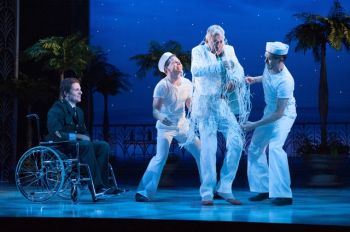
They were aware of the problem but didn’t know what to do about it?
He considers this. “I think it might have a lot to do with the Cameron Mackintosh thing of the rostered day off and ‘the show is the star and everybody is replaceable’. It takes away a sense of personal pride in doing one’s job.”
Did director Simon Phillips not see how things were going?
“Simon left the show as soon as it was on and we were left in the charge of the resident director. I found myself explaining a lot of the show to him.
“He was fascinated. There were things he didn’t know about the characters, so that was interesting. I suppose it was different for me in that I had been with Priscilla from the start, so people listened if I said things were going off the rails.
“They thought I was walking around with a look of disapproval on my face and it was probably better that I left. So I did. I felt I didn’t fit in in London, whereas in America it was a different ball game.
So would you say Australians work more in the Broadway tradition?
“Oh, yes, very much so. When I got back to New York I felt I was on familiar ground. They love Aussies. I was surprised at how many were working. There was a girl in Chicago, the understudy to Mary Poppins was an Aussie, Mig Ayesa was starring in Rock of Ages, Rachel Griffiths was doing Other Desert Cities. They love us because we’re workhorses.
“Broadway has become more of a global village now and kids are heading over there straight out of drama school. It would never have occurred to my generation to pick up and go. Kids are hungrier for success earlier now because of TV shows like Australian Idol and Australia’s Got Talent.”
***
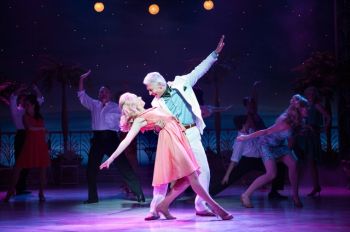 So how come the happy, established, newly Manhattaned Tony Sheldon is back in Australia?
So how come the happy, established, newly Manhattaned Tony Sheldon is back in Australia?
“I was invited,” he smiles happily. “I was asked to come back to do Dirty Rotten Scoundrels. It was a show that I had wanted to do when the Production Company did it in Melbourne, but I was in London at the time.
“Fortunately for me George Youakim and Stephen Doorey [from the emerging James Anthony Productions] have been most persistent. They waited for me to finish doing Hello, Dolly! in Connecticut. They’re new producers, they’re young and they’re keen, and they’re taking a big risk in doing a show that’s not a revival.”
Scoundrels is based on the successful 1988 comedy movie starring Michael Caine and Steve Martin, which was itself based on the 1964 Bedtime Story in which the two conmen were played by David Niven and Marlon Brando. Sheldon plays the suave Caine/Niven character.
The musical had a respectable 18-month run on Broadway, scoring 11 Tony Award nominations, but after the Production Company’s 2009 staging it had been released to local community theatres. Several productions have already been noted and reviewed in Stage Whispers, so it’s unusual for a professional production to be mounted at this later stage.
“Yes, it’s a big risk for everybody,” says Sheldon cheerfully. “We all want it to work for them so that they will do other shows and continue on in the business. They’re booking it for a month [at Sydney’s Theatre Royal] and we’ll extend accordingly should we do well.
“It’s a luxury cast and I’m dead impressed with what I’m seeing in the rehearsals. I’m very, very happy with it.”
***
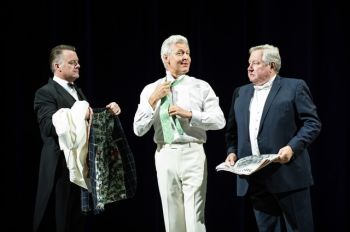 What, I wondered, will Tony Sheldon’s 2014 schedule look like when he returns home to Inwood, NY?
What, I wondered, will Tony Sheldon’s 2014 schedule look like when he returns home to Inwood, NY?
“I’ve been ‘attached’, as they say, to a couple of things. The one that seems most likely to happen is a musical version of the film Ever After. It was a [1998] film starring Drew Barrymore, based on the Cinderella story and now it’s a beautiful new musical to be directed and choreographed by Kathleen Marshall [Grease, Anything Goes, etc].
“It’s difficult because the Rodgers and Hammerstein Cinderella is currently on Broadway and we can’t go at the same time as them.
“I’ve already done three workshops of Ever After playing Leonardo da Vinci, so if it happens I will probably be in that, fingers crossed.”
Dirty Rotten Scoundrels plays at the Theatre Royal, Sydney until December 8, 2013.
www.dirtyrottenscoundrels.com.au
Production photos from Dirty Rotten Scoundrels by Kurt Sneddon.
More Reading
Originally published in th November / December 2013 edition of Stage Whispers.
Subscribe to our E-Newsletter, buy our latest print edition or find a Performing Arts book at Book Nook.

